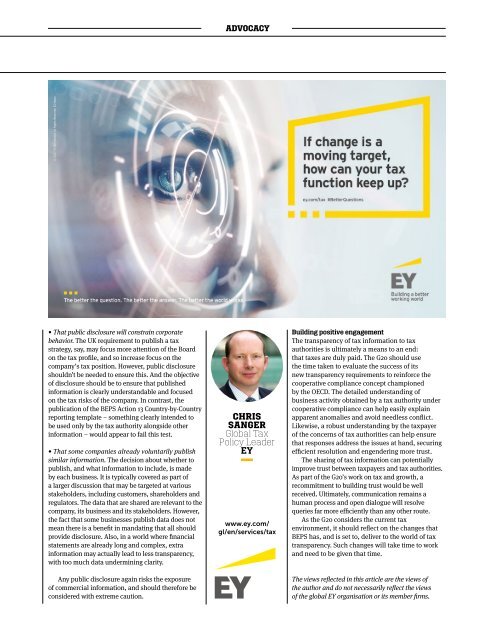G20-Germany-Hamburg-2017
mo.rami@trmg.co.uk
mo.rami@trmg.co.uk
Create successful ePaper yourself
Turn your PDF publications into a flip-book with our unique Google optimized e-Paper software.
ADVOCACY<br />
• That public disclosure will constrain corporate<br />
behavior. The UK requirement to publish a tax<br />
strategy, say, may focus more attention of the Board<br />
on the tax profile, and so increase focus on the<br />
company’s tax position. However, public disclosure<br />
shouldn’t be needed to ensure this. And the objective<br />
of disclosure should be to ensure that published<br />
information is clearly understandable and focused<br />
on the tax risks of the company. In contrast, the<br />
publication of the BEPS Action 13 Country-by-Country<br />
reporting template – something clearly intended to<br />
be used only by the tax authority alongside other<br />
information – would appear to fail this test.<br />
• That some companies already voluntarily publish<br />
similar information. The decision about whether to<br />
publish, and what information to include, is made<br />
by each business. It is typically covered as part of<br />
a larger discussion that may be targeted at various<br />
stakeholders, including customers, shareholders and<br />
regulators. The data that are shared are relevant to the<br />
company, its business and its stakeholders. However,<br />
the fact that some businesses publish data does not<br />
mean there is a benefit in mandating that all should<br />
provide disclosure. Also, in a world where financial<br />
statements are already long and complex, extra<br />
information may actually lead to less transparency,<br />
with too much data undermining clarity.<br />
Any public disclosure again risks the exposure<br />
of commercial information, and should therefore be<br />
considered with extreme caution.<br />
CHRIS<br />
SANGER<br />
Global Tax<br />
Policy Leader<br />
EY<br />
www.ey.com/<br />
gl/en/services/tax<br />
Building positive engagement<br />
The transparency of tax information to tax<br />
authorities is ultimately a means to an end:<br />
that taxes are duly paid. The <strong>G20</strong> should use<br />
the time taken to evaluate the success of its<br />
new transparency requirements to reinforce the<br />
cooperative compliance concept championed<br />
by the OECD. The detailed understanding of<br />
business activity obtained by a tax authority under<br />
cooperative compliance can help easily explain<br />
apparent anomalies and avoid needless conflict.<br />
Likewise, a robust understanding by the taxpayer<br />
of the concerns of tax authorities can help ensure<br />
that responses address the issues at hand, securing<br />
efficient resolution and engendering more trust.<br />
The sharing of tax information can potentially<br />
improve trust between taxpayers and tax authorities.<br />
As part of the <strong>G20</strong>’s work on tax and growth, a<br />
recommitment to building trust would be well<br />
received. Ultimately, communication remains a<br />
human process and open dialogue will resolve<br />
queries far more efficiently than any other route.<br />
As the <strong>G20</strong> considers the current tax<br />
environment, it should reflect on the changes that<br />
BEPS has, and is set to, deliver to the world of tax<br />
transparency. Such changes will take time to work<br />
and need to be given that time.<br />
The views reflected in this article are the views of<br />
the author and do not necessarily reflect the views<br />
of the global EY organisation or its member firms.
















